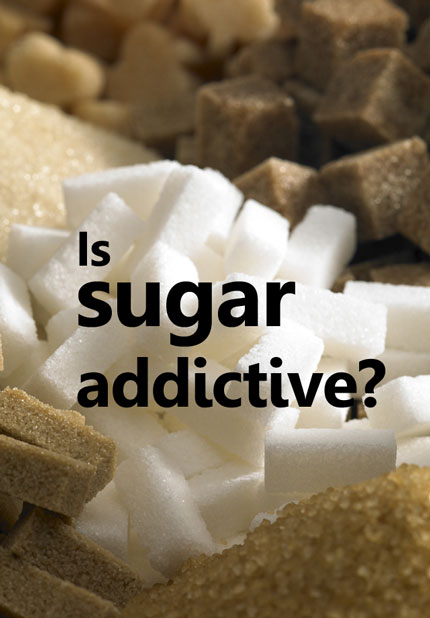
References
In rats: Colantuoni et al, Evidence That Intermittent, Excessive Sugar Intake Causes Endogenous Opioid Dependence, Obesity Research Volume 10, Issue 6, pages 478–488, June 2002
In humans: Fraser, Junk: Overeating and obesity and the neuroscience of addiction, Jan 2013
"Our results provide novel evidence that frequent consumption of ice cream, independent of body fat, is related to a reduction in reward-region responsivity in humans, paralleling the tolerance observed in drug addiction. Data also imply that intake of a particular energy-dense food results in attenuated reward-region responsivity specifically to that food, which suggests that sensory aspects of eating and reward learning may drive the specificity." Burger, K. S., & Stice, E. (2012). Frequent ice cream consumption is associated with reduced striatal response to receipt of an ice cream-based milkshake. The American journal of clinical nutrition, 95(4), 810–7. doi:10.3945/ajcn.111.027003
Wang et al, Imaging of Brain Dopamine Pathways: Implications for Understanding Obesity, J Addict Med. 2009 Mar;3(1):8-18.
Nicole M. Avena, Pedro Rada, Bartley G. Hoebel, Evidence for sugar addiction: Behavioral and neurochemical effects of intermittent, excessive sugar intake, Neuroscience & Biobehavioral Reviews, Volume 32, Issue 1, 2008, Pages 20–39
"a high number of alcohol-dependent and other drug-dependent individuals have a sweet preference, specifically for foods with a high sucrose concentration… both human and animal studies have demonstrated that in some brains the consumption of sugar-rich foods or drinks primes the release of euphoric endorphins and dopamine within the nucleus accumbens, in a manner similar to some drugs of abuse. The neurobiological pathways of drug and "sugar addiction" involve similar neural receptors, neurotransmitters, and hedonic regions in the brain. Craving, tolerance, withdrawal and sensitization have been documented in both human and animal studies. In addition, there appears to be cross sensitization between sugar addiction and narcotic dependence in some individuals. It has also been observed that the biological children of alcoholic parents, particularly alcoholic fathers, are at greater risk to have a strong sweet preference, and this may manifest in some with an eating disorder. In the last two decades research has noted that specific genes may underlie the sweet preference in alcohol- and drug-dependent individuals, as well as in biological children of paternal alcoholics. There also appears to be some common genetic markers between alcohol dependence, bulimia, and obesity, such as the A1 allele gene and the dopamine 2 receptor gene." Fortuna, J. L. (2010). Sweet preference, sugar addiction and the familial history of alcohol dependence: shared neural pathways and genes. Journal of psychoactive drugs, 42(2), 147–51.
Why We Get Fat: And What to Do About It (book) by Gary Taubes- P143
Photo












